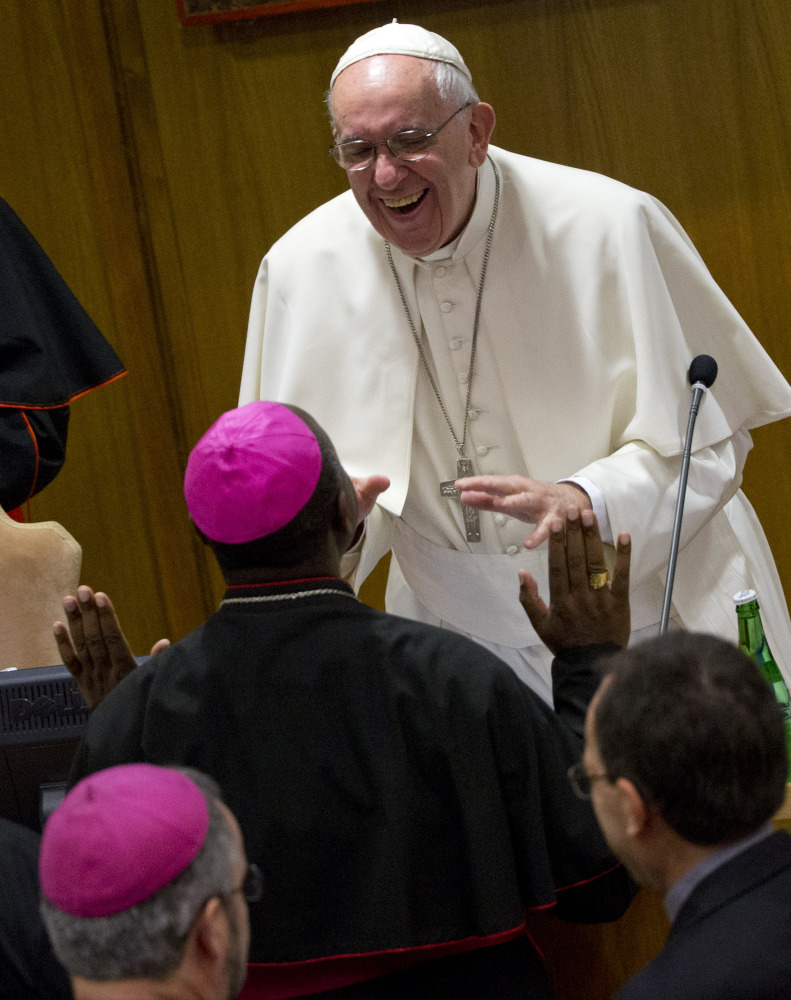VATICAN CITY — The Vatican press office defended its reporting of a big meeting on family issues Thursday after a dispute arose over what Pope Francis told bishops behind closed doors about his hopes for a free and open debate.
One of the participants in the synod, the Rev. Antonio Spadaro, tweeted this week that Francis had warned the prelates against falling into a “conspiracy” mindset as they discuss how the church can better minister to Catholic families, gays, divorcees and couples in civil unions.
But in his briefing to reporters Tuesday, the Vatican spokesman, the Rev. Federico Lombardi, didn’t quote Francis as making such an explosive and critical admonition. His summary of Francis’ remarks was more generic, and a text of Francis’ remarks was never provided to the media.
Lombardi confirmed Thursday that the pope indeed uttered the words, but said he wasn’t obliged to make public everything that everyone says.
The dispute underscored what veteran Vatican watcher John Allen called the “dirty little secret” of reporting on the synod: Journalists aren’t allowed inside, and must rely on Vatican spokesmen or the participants themselves to recount after the fact what was said.
Given the passions, divisions and sheer numbers at play, that can produce lopsided, ideologically driven or even contradictory reports.
On Wednesday, for example, Philadelphia Archbishop Charles Chaput told a news conference that many Africans felt that the draft document for the meeting was too focused on issues of concern to the West, and not Africa.
On Thursday, Monsignor Charles Palmer-Buckle, archbishop of Accra, Ghana, said that, on the contrary, the document reflected the concerns of the universal church.
Lombardi was asked Thursday about the “conspiracy” comment and whether Francis did indeed say it.
Spadaro, a fellow Jesuit who is close to Francis, had tweeted that the pope had asked the bishops to “not give into the ‘hermeneutic of conspiracy’ which is sociologically weak and spiritually doesn’t help.”
Lombardi said he follows a “precise criteria” in his reports to the media about what goes on behind closed doors, suggesting that he omitted Francis’ admonition on purpose.
Lombardi often consults with Francis or his secretaries about what to reveal about the pope’s private conversations, and Francis has been adamant in insisting that the synod is a “protected” space where bishops should feel free to express themselves.
Lombardi said what the pope meant by speaking of “conspiracies” was that he wanted the meeting to be a process of sincere discussion without any “plots of people who try to manipulate” the outcome.
Send questions/comments to the editors.



Success. Please wait for the page to reload. If the page does not reload within 5 seconds, please refresh the page.
Enter your email and password to access comments.
Hi, to comment on stories you must . This profile is in addition to your subscription and website login.
Already have a commenting profile? .
Invalid username/password.
Please check your email to confirm and complete your registration.
Only subscribers are eligible to post comments. Please subscribe or login first for digital access. Here’s why.
Use the form below to reset your password. When you've submitted your account email, we will send an email with a reset code.